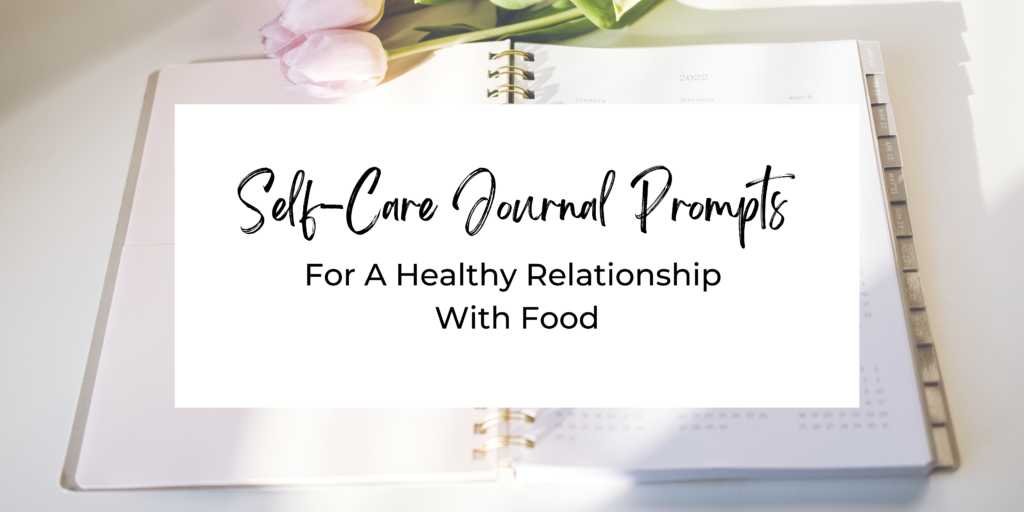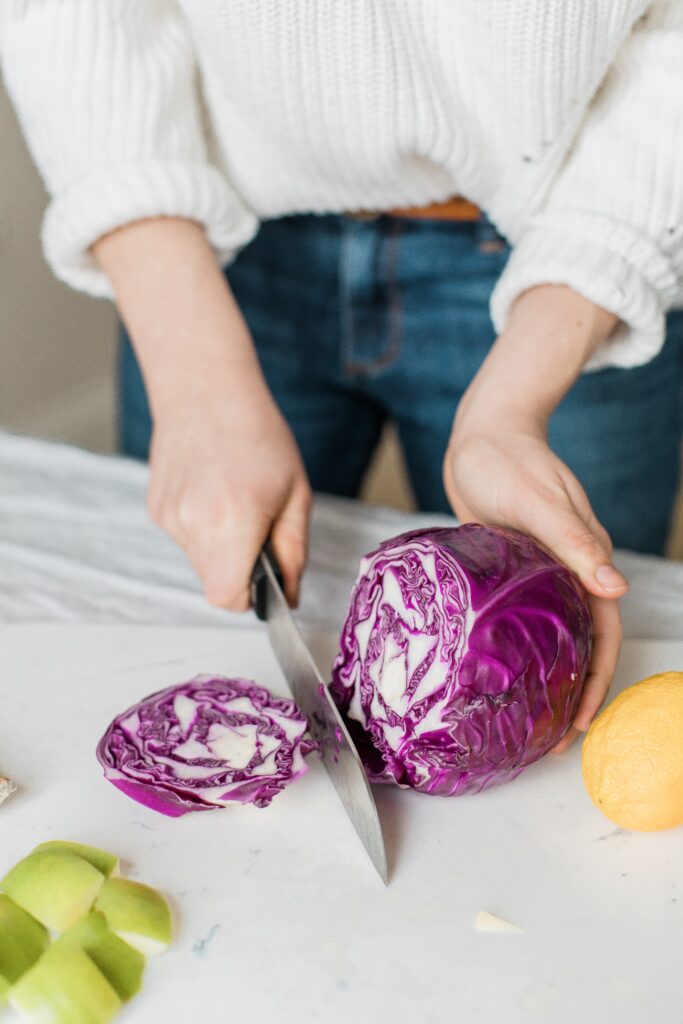The term “self-care” gets thrown around a lot as simply pampering activities, like bubble baths or pedicures. But it can also include a broad range of activities that can lend to a bigger quality of life. And regular self-care CAN help promote a better relationship with eating and one’s body image. Read on to learn more about how self-care can help guide you towards becoming an intuitive eater, and how to use journal prompts to help you create a regular self-care routine.

Emotional eating is a completely normal human capability.
Does this sound crazy? It’s not! There’s a lot science and research that backs that up.
We humans are emotional beings. And since eating is required for us to live and thrive, it’s very likely that a highly emotional moment may link up with our biological need to eat at some point. This is not a good or bad thing – it’s just a thing. Eating while emotion is present can be observed simply as a human behavior.
When I work with clients who want to cultivate a healthier relationship with food, I strive to neutralize emotional eating. In our culture that so readily judges other people’s eating experiences, it can be very easy for a person to experience massive amounts of negative self-talk and shame if they eat emotionally. When these unpleasant experiences continue, a person can begin to develop a really negative view of themselves and of food.
Here’s the thing: sometimes emotional eating is just a coping mechanism for when life gets complicated or overwhelming. Us humans are pretty good at finding ways to deal with stress, and eating can actually send soothing signals to our brain. So, again, this IS normal. But it may not always feel good, and this is where focusing on self-care can be crucial.
Why Self-Care Is Key To A Healthy Relationship With Food
According to the Intuitive Eating Workbook, self-care is defined as the daily process of attending to your basic physical and emotional needs, which include the shaping of your daily routine, relationships, and environment, as needed to promote self-care. It includes a broad range of activities, such as getting enough sleep and attending to emotional, physical, relationship, and spiritual needs.
So, self-care is actually a very important part of meeting our basic human needs. In fact, it’s so important that the American Psychological Association has included it as an ethical requirement for psychologists so they can be emotionally and mentally prepared to handle the needs of their patients.
The long and short of it is this: when our needs are not met, we are not able to show up for other parts of our lives. And then stress and emotions can build up and naturally, over time, we’ll look for a way to cope. If you tend to your needs and provide yourself care, you will be able to handle your stress and emotions better.
One way to help strengthen your self-care awareness is to start using daily journal prompts.
Journal Prompts For Self-Care
Use these journal prompts daily or weekly to help cultivate self-compassion, awareness, and appreciation for your body and health:
Physical Needs
-
- How can I add enjoyable movement to my day?
-
- What do I need to kindly nourish my body today?
-
- How do I want to feel in my body today?
-
- What’s one thing I can do today to show my body respect?
-
- If I had to choose just one way to appreciate my body, what would that be?
-
- What can I wear that will help me feel comfortable?
-
- How has my sleep been lately? Will this affect my mood or eating habits later?
-
- What has my body allowed me to accomplish and be proud of lately?
Emotional and Psychological Needs
-
- What will I need for support today?
-
- What can I do to give myself permission to relax today? Would that serve me?
-
- What boundaries will I need to set today?
-
- Would I feel more rested if I was around others, or would it be helpful for me to have some time alone?
-
- When can I add in something that I enjoy today?
-
- If I have a difficult moment, what is something that might bring me peace?
-
- If I’ve experienced a difficult eating moment recently, what may have affected that? Going forward, what would I like to do differently?
-
- Am I noticing any self-judgment or critical inner voices? Can I approach this with curiosity and neutrality instead?
-
- When was a time I was really content? Can I do one thing today to help achieve that?
-
- Would adding a spiritual practice to my day be useful?
Save these prompts for anytime you experience difficult eating moments, and see if they help give you more insight. Remember that offering care and compassion to yourself is a really important piece of the intuitive eating puzzle!
Need more support? Click here to join the waitlist for my next my virtual Intuitive Eating support group.
Want a more personalized approach? Sign up for a free 15-minute inquiry call here to see if individual nutrition counseling is right for you.








